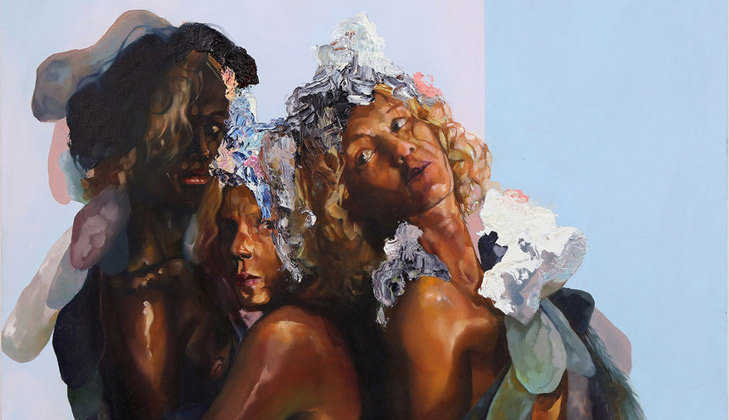(Image above: “Run Little White Girl” by David Antonio Cruz)
It was a hot Friday night in New York City in 1969. Across from Christopher Park in Greenwich Village, the Stonewall Inn bar, a haven for drag queens and crossdressers, was packed with the usual crowd. Like many gay bars at that time in New York, the bar was operated illegally by the mob. Around 1 a.m. that Saturday morning, eight undercover officers entered intending to close the bar for good.
At the time, it was a crime to “masquerade” as a person of the opposite sex, so the officers immediately targeted drag queens and crossdressers for arrest as the police van pulled up. Outside the bar, according to reports, police were roughing up a lesbian person in handcuffs when the growing crowd had enough and began fighting back.
Throughout the Stonewall riot and the demonstrations during the following six days, a homeless, Black transgender woman, Marsha P. Johnson, began to emerge as the movement’s leader. Stonewall was the beginning of a new era for the LGBTQ+ community regarding civil rights and social advocacy.
Fifty years later, Johnson’s rallying cry, “nobody promised you tomorrow,” would become the title of a critically acclaimed 2019 art exhibition at the Brooklyn Museum commemorating the Stonewall uprising anniversary.
With the help of a $205,000 grant from The McClatchy Fresno Arts Endowment of The James B. McClatchy Foundation, the Center for Creativity and the Arts will present the “Nobody Promised You Tomorrow: Art 50 Years After Stonewall” exhibition, Aug. 19 through Oct. 31, 2021, at the Phebe Conley Art Gallery at Fresno State.
In addition to works displayed at the 2019 Brooklyn Museum exhibition, the Center for Creativity and the Arts will work with the Brooklyn Museum to include local and West Coast artists. A catalog of the exhibition will be available through the center.
“At Fresno State, our core values are diversity, distinction and discovery. Without a doubt, ‘No One Promised You Tomorrow: Art 50 Years After Stonewall’ reflects those values and provides a strong educational platform to learn and be curious about Fresno’s own history and participation in significant cultural legacies such as LGBTQ+ civil advocacy and the Feminist Art Movement,” said Dr. Cindy Urrutia, director for the Center for Creativity and the Arts. “We also believe that this exhibit aligns with the James B. McClatchy organization’s values and goals and will garnish significant interest — attracting visitors from all over California.”
Urrutia notes that most artists in the exhibition are of color and their art reflects their personal experiences in the post Stonewall era.
“This is significant because many early discussions on LGBTQ+ have not always included communities of color. Thus, one sees significant intersections of various identity groups within the LGBTQ+ community,” Urrutia said.
“Nobody Promised You Tomorrow: Art 50 years After Stonewall” was organized by the Brooklyn Museum and curated by Margo Cohen Ristorucci, public programs coordinator; Lindsay C. Harris, teen programs manager, education; Carmen Hermo, associate curator, Elizabeth A. Sackler Center for Feminist Art; Allie Rickard, former curatorial assistant, Elizabeth A. Sackler Center for Feminist Art; and Lauren Argentina Zelaya, director, public programs, with assistance from Levi Narine, former teen programs assistant, InterseXtions and special projects, Brooklyn Museum. This presentation was adapted by the Center for Creativity and the Arts at Fresno State.
The Center for Creativity and the Arts’ mission is to engage the public with the arts through dynamic interdisciplinary programming that highlights local topics that have global perspectives. As an institution, the center is committed to contributing to the intellectual, social and artistic life of the University and the Central Valley and seeks to create an environment where the arts function as a catalyst for intellectual and creative conversations that are grounded in the everyday life of the Central Valley.
Founded in 1994, Susan and the late James B. McClatchy envisioned an organization that would address two issue areas important to California: the needs of English learners and the protections of the First Amendment in free speech, freedom of expression and a free press. Since then, the James B. McClatchy Foundation has made grants across its footprint in the Central Valley, and strives to make bold investments for long-lasting impact.





